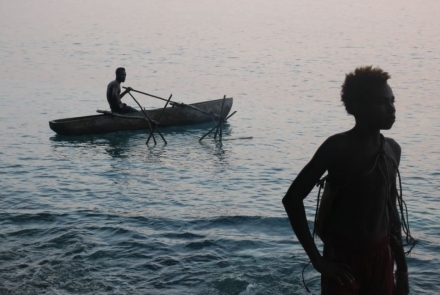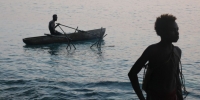
PHOTO: Ben Bohane
Pacific Wayfinder: Facing the climate crisis in the Pacific
As the severe and urgent nature of the climate crisis becomes more apparent, governments around the world must take heed of the experts and Pacific peoples who are sounding the alarm, Ben Bohane writes for the Pacific Wayfinder series.
The world’s peak body of climate scientists, the Intergovernmental Panel on Climate Change (IPCC), release their comprehensive reports every seven years or so, with the next due on 9 August. The report will provide an important scientific update ahead of November’s global gathering of leaders in Glasgow for 26th UN Climate Change Conference of the Parties.
The report, known as the ‘Working Group 1 contribution to the Sixth Assessment Report (AR6)’, is said to focus on the “raw science”. It involves the work of thousands of scientists and vast data inputs to form a picture of how our earth systems are coping with rising temperatures and the associated effects of climate change.
To discuss how this important report is making waves in the Pacific, IPCC Vice Chair Professor Mark Howden and academic Salā Dr George Carter spoke on the new episode of the Pacific Wayfinder podcast.
Professor Howden emphasised the sobering findings of the report:
“It is very serious….the more we know about climate change, the more the science community gets concerned. In a sense, the more we know, the worse it looks. Just one example is that the impacts of climate change are accumulating almost every day,” he said.
“A very recent example is the Canadian heatwaves and bushfires, which have a climate signal embedded in them. And if we look more broadly, we can see linkages to droughts, linkages to floods. Of course, there’s heatwaves associated with climate change and really importantly for the Pacific islands, a sea level rise.”
Professor Howden warned that the world is moving towards a 1.5 degree temperature rise faster than anticipated, perhaps as soon as the 2030s – a decade earlier than forecast.
The IPCC was originally formed in 1988 by the World Meteorological Organisation and the United Nations (UN) Environment Program and was then endorsed by the UN General Assembly.
As Professor Howden pointed out, it is “owned” by every government in the world, not the scientific community.
“The IPCC is the peak scientific body…a partnership between governments and the researchers, the science community, and that allows us not only to do good science, but for that to be owned by governments”.
Pacific Island governments and scientists are well aware of the urgency of climate mitigation and the role the IPCC plays in collating the science, even if the wider community may not be aware of their processes.
“Look, the urgency has been something many Pacific island countries have been calling for since the 1980s, so this is nothing new,” said Dr Carter.
“A lot of actions we’ve been waiting for have not been undertaken in terms of (various) states’ responsibilities and in mitigation practices, but also in terms of financing and support for adaptation.”
Dr Carter believes the IPCC’s profile in the Pacific is mostly “contained in very close circles, especially within academia and science and those working around climate change policy”. However the Pacific plays an important role in contributing to IPCC reports while also making information available via regional organisations such as the Secretariat of the Pacific Regional Environment Programme (SPREP).
“Many Pacific countries are important sources of scientific information in terms of climate impacts in the Pacific. It informs the way that our research is also conducted, especially now in terms of the humanities and where we should be focusing our research areas in terms of the impacts on human behaviour, on community behaviour, state behaviour and also regional behaviour,” Dr Carter said.
Pacific scientists are being trained and already some are contributing to the IPCC reports, which gives the Pacific a greater stake in the process. This is crucial as it is Pacific peoples who are at the forefront of a climate change adaptation process which is impacting everyone on earth. As such, other countries would do well to listen to the warnings of the IPCC and Pacific states.
As Dr Carter said: “the IPCC reports and the scientists (involved) are the unseen heroes of our time”.
This article is from our Pacific Wayfinder series, bringing you voices from the Pacific Island region. It is produced in conjunction with the Pacific Wayfinder podcast, produced by the Australia Pacific Security College.
Updated: 16 August 2024/Responsible Officer: Crawford Engagement/Page Contact: CAP Web Team












